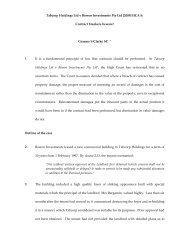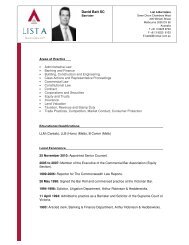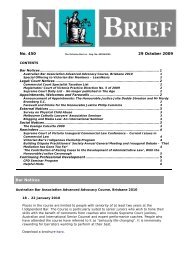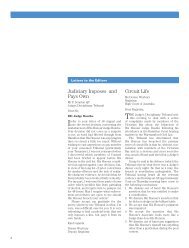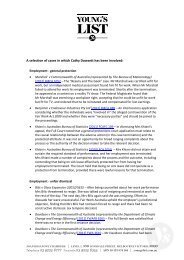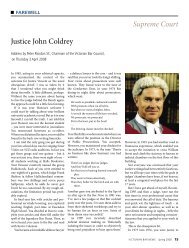Justice William Charles Crockett AO - Victorian Bar
Justice William Charles Crockett AO - Victorian Bar
Justice William Charles Crockett AO - Victorian Bar
- No tags were found...
Create successful ePaper yourself
Turn your PDF publications into a flip-book with our unique Google optimized e-Paper software.
News and Views/A Bit About WordsIssueTHE dominant meaning of issue ischanging. It is now commonly usedto mean problem or difficulty. Itis common, and mildly irritating, to hearotherwise well-spoken people say “I havean issue with the way he is treating me”or “He has personality issues”. It hasemerged as a euphemism: it is less confrontingthan problem, especially in thephrase personality issues.Issue has many meanings, but problemwas not one of them, at least until veryrecently. As a noun, the principal meaningsof issue are:• the action of going, passing, or flowingout• a place or means of egress• outgoing; termination• a discharge of blood or other matterfrom the body• offspring, progeny• produce, proceeds; profits arising fromlands or tenements• that which proceeds from any source;the outcome or product of any practiceor condition• the outcome of an action or course ofproceedings• a point or matter in contention betweentwo parties• the action of sending or giving out officiallyor publicly; an emission of bills ofexchange, shares, etc.• the set number or amount (of coins,notes, stamps, copies of a newspaper,books and periodicals, etc.) issued atone time, or distinguished in some wayfrom those issued at another time.As a verb, the principle meanings are:• to come forth (“I did never know so fulla voice issue from so empty a heart”Shakespeare, Henry V Part I, 4: iv)• to proceed as an outcome (“And of thysons that shall issue from thee, whichthou shalt beget, shall they take away;and they shall be eunuchs in the palaceof the King of Babylon”: King JamesVersion of the Bible, 2 Kings 20:18)• to be published (“His Majesty didresolve to Summon a great Council ofall the Peers, and commanded Writs toissue out accordingly”)• (as a transitive verb) to give or sendout authoritatively or officially; to sendforth or deal out in a formal or publicmanner.68This last sense is the commonest. So,government agencies issue passports,licences, permits, etc.The notion of a thing being producedas the result of an earlier process is inherentin most senses of issue, as verb and asnoun. Oddly, this is the sense that is nowdisappearing from the noun, although itsurvives intact in the verb.One principal use of the noun is a pointor matter in contention between two parties.This meaning of the word has a specificallylegal background. It emerged fromthe system of pleadings. The OED gives itas “The point in question, at the conclusionof the pleadings between contendingparties in an action, when one side affirmsand the other denies”. Despite this arcanebeginning, this has become the commonestintended sense.The idea of “a point of contention” maybe the reason for the emergence of thenew sense. A point at issue can also bea problem; often it is. Take the followingrecent headlines from the ABC’s website:• Drugs in sport a hard issue to tackle.• Depression: A medical or social issue.• The north faces a weighty issue.• Wheat export issue divides growers.• But raising this almost-taboo subjectfor public discussion at this week’sconference can only lead to a betterunderstanding of this disturbing issue.In most, if not all, of these examplesit makes equal sense to understand thereference as problem rather than pointfor debate.But recourse to recent dictionariesconfirms our fears (and vindicates theABC website, Kath & Kim, and all otherswho like the new meaning). Thecurrent edition of the Compact OxfordDictionary has, as its first definition ofissue: “an important topic for debate orresolution”. It refers to the phrase makean issue of as meaning to treat too seriouslyor as a problem.The Encarta Dictionary gives as itsdefinition: “subject of concern: somethingfor discussion or of general concern; mainsubject: the central or most importanttopic in a discussion or debate”.The Merriam-Webster Dictionaryrecognizes problem as one of the meaningsof issue. Older and larger dictionariesgive this meaning less prominence.The American Heritage Dictionaryacknowledges the new meaning also: itsfifth definition is: a personal problem oremotional disorder.The Cambridge Advanced Learners’Dictionary is slightly more conservative:it acknowledges problem as an availablemeaning, when issues (plural) is used. Itgives as examples:All the people in the study had low selfesteemand had issues with their bodies.Anna has major issues with her employer.The Cambridge Dictionary ofAmerican English is at once more adventurousand more restrained. It appears toacknowledge that the singular form hasshifted meaning, but does not quite takethe change to its full extent:“Issue”: a subject or problem that peopleare thinking and talking aboutThere continues to be a great dealof debate over the abortion issue.Isn’t the need to hire more staff what’sreally at issue here (= the subject of thedisagreement)?I like my hair this way, I don’t see whyyou have to make an issue of it (= causeit to be a problem).The new meaning can fairly be said tohave established its place in our language.The earlier, original meaning of issueis outcome or product. Thus, Aphra Behnin Rover (1677): “That what to you doeseasy seem, and plain, Is the hard issueof their labouring Brain.” And Dickens inDavid Copperfield: “Of course my auntwas immediately made acquainted withthe successful issue of the conference,and with all that had been said and donein the course of it.”It is surprising that this sense of issuehas almost disappeared, because thenotion of coming forth is present in mostother meanings of the noun. So, a shareissue and an issue of a magazine areboth current usages; and issue as a verbalways refers to a thing being produced.Tom Paine wrote: “By perseveranceand fortitude we have the prospect of aglorious issue; by cowardice and submission,the sad choice of a variety of evils…” (The American Crisis, 1790). That




